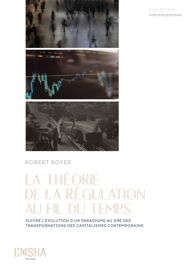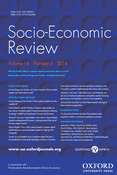Mooc « C’est quoi l’éco ? » ENS de Lyon.FUN.Mai 2017, Entrevue, Séance 6.4- Les politiques économiques en France et en Europe. Robert BOYER, Alain TRANNOY
Suivre l’évolution d’un paradigme au gré des transformations des capitalismes contemporains, R. Boyer (dir), Avril 2018, Editions des maisons des sciences de l’homme associées, Collection interdisciplinaire EMSHA , La Plaine Saint Denis
Le présent ouvrage propose au lecteur un aperçu sur la trajectoire intellectuelle d’un groupe de chercheurs qui se sont attachés à éclairer certaines questions liées à la recherche sur l’économie et la société selon les approches développées par la Théorie de la Régulation, ceci à travers un permanent aller-retour entre les enseignements et prédictions du cadre conceptuel élaboré pour rendre compte de la rupture des Trente glorieuses et de la réalité des évolutions observées depuis lors.
La particularité du présent ouvrage est de donner à voir l’ajustement de ce paradigme d’année en année jusqu’à la période contemporaine. En quelque sorte, il propose de visiter le laboratoire d’où sont sorties les nombreuses publications dérivées de la Théorie de la Régulation.
Présentation powerpoint au Séminaire « Planning and Long-Term Perspective in Economics », INALCO, Paris, 6 Avril, 2018
Présentation au Colloque « Gouvernement, Participation et Mission de l’entreprise », Collège des Bernardins, Paris,
16 mars 2018
In : La dette souveraine: Etat et économie politique, sous la direction de Julia Christ et Gildas Salmon, Collection « Raisons pratiques », Éditions de l’EHESS, Paris, Mars 2018, p. 9-47.
Entretien France Culture, Entendez-vous l’eco?, par Maylis Besserie, 26 Septembre 2017.
Deuxième jour de notre série consacrée à “l’esprit du capitalisme”.
Hier, nous nous sommes glissés dans la peau du sociologue Max Weber, auteur de l’ouvrage éponyme sur les origines de l’émergence du capitalisme et ses liens avec l’éthique protestante. Aujourd’hui, nous continuons à parler de capitalisme, mais en utilisant volontairement le mot au pluriel – pour pointer la diversité des systèmes économiques et politiques qu’il recouvre.
Nous allons parler de la théorie de la régulation et de son analyse en compagnie de l’une de ses grandes figures: Robert Boyer.
 In En quête d’alternatives. L’état du monde 2018, (sous la direction de Bertrand Badie et Dominique Vidal), La Découverte, Septembre 2017, p.224-230.
In En quête d’alternatives. L’état du monde 2018, (sous la direction de Bertrand Badie et Dominique Vidal), La Découverte, Septembre 2017, p.224-230.
Socio-Economic Review, Discussion Forum: « Brexit: understanding the socio-economic origins and consequences » , 2016, Vol. 14, n° 4, p. 836-845.
Abstract
Jacqueline O’Reilly, Julie Froud, Sukhdev Johal, Karel Williams, Chris Warhurst, Glenn Morgan, Christopher Grey, Geoffrey Wood, Mike Wright, Robert Boyer, Sabine Frerichs, Suvi Sankari, Akos Rona-Tas and Patrick Le Galès
The unprecedented geopolitical shift resulting from Brexit reflects deep socio-economic fault lines within and beyond the UK. In many ways foreshadowing the US presidential election of Donald Trump, Brexit brought to the surface and gave a public voice to socio-economic divisions that were deeply embedded, sometimes illogical, but until now had either been ignored or hushed out of ‘respectable’ public debate. This Discussion Forum emanates from a spontaneous seminar organized 2 days after the Brexit vote on June 25, 2016 as part of the SASE conference held in University of California–Berkeley and followed by an open call for papers by Socio-Economic Review. The papers here draw attention to the origins of the Brexit vote in deep-seated socio-economic divisions (O’Reilly), widening differences in economic performance across sectors and regions of the UK (Froud, Sukhdev and Williams) and the growth of poor quality jobs (Warhurst). Meanwhile, the political dynamics of the Brexit vote were also shaped by the fractured nature of UK business elites (Morgan), divisions between locals and cosmopolitans (Grey) and creative but muddled actions of elites that arguably generated consequences they themselves failed to fully anticipate (Wood and Wright). From the perspective of Europe, Brexit reflects a history of dysfunctional economic policy in Europe that prioritized market competition in ways that neglected and ultimately undermined solidarity (Boyer). Here, Brexit reflects a political strategy to both renationalize and recommodify solidarity in the face of fears over migration, and which are likely to have major consequences for social solidarity in Europe more generally (Frerichs and Sankari). However, Brexit is unlikely to provide a durable social and political solution to the wider tensions between globalization and democracy, which also affect all countries throughout Europe (Rona-Tas). Ultimately, the Brexit vote underlines social divisions that combine class inequalities with regional ones, not just in Britain but throughout Europe (Le Galès).



